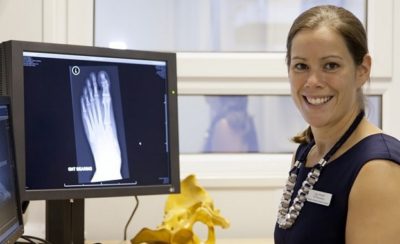
Interview with Lucy Cassidy
Digital Transformation Consultant
Dynamics 365
Lucy Cassidy is quickly becoming a well-known name in the world of IT in Healthcare. In August 2013, Cassidy launched the Virtual Fracture Clinic in Brighton – an alternative for outpatient treatment which enables self-care from the home. Since launching, the Virtual Fracture Clinic has managed over 10,000 patients and reduced outpatient appointments by 57%. Cassidy’s solution has saved the NHS over £750,000 – and this is only the beginning. In late 2017, AlfaPeople was invited to partner with Cassidy for the next phase of development in the Virtual Fracture Clinic – including a mobile app and expansion of services.
We decided to interview Cassidy and find out more about the project and how it will transform the outpatient experience. Here’s what she had to say.
How did the project for the Virtual Fracture Clinic come about?
Originally, I worked for the NHS for ten years. From there I set up the Virtual Fracture Clinic in Brighton. During this time, I thought about how we could do things differently. I had a vision to allow people to maximise their skillsets and reduce the need for patients to come to the hospital for their appointments. With this, I launched the Virtual Fracture Clinic, which also led to a few awards.
Amazing, which awards were these?
In 2015, I won the NHS Best Practice Adoption award and also that year I won the Allied Health Professionals Entrepreneur of the Year award.
So how does the NHS fit into the project?
I’ve always thought how can we share our practices with the NHS to benefit the wider scope. I tried in Brighton to share everything we were doing but soon realised that the biggest missing piece was the technology to support the service. Technology would enable it to run to the highest level of efficiency.
Back in January last year we launched a platform on Microsoft Dynamics 365 using the Azure Portal. That went really well, but the patient portal side of it needed some work. We had a lot of patients calling up and not knowing how to log in, forgetting their passwords. The experience wasn’t quite what I wanted it to be.
How did you overcome this obstacle?
I had a look around at other solutions and decided to work with a private company to build the solution in a much better way, so it could be beneficial across the NHS. That’s when I went to look for partners and found AlfaPeople, who were willing to build the app in a different way that matched Microsoft Dynamics with a specific rehabilitation app, rather than trying to use a portal. With portals, you have to create content and every single hospital would find themselves in a situation where they’re creating content. Whereas linking it to a rehab app that’s got over four thousand exercises in it, just makes perfect sense.
Will the app function across devices?
The app is on your watch, phone, tablet, everything, and goes through all your exercises. When you have an injury. you’ll be sent a code to log in to the rehab app. You will then be given six weeks’ worth of exercises which are delivered to you on a daily basis. From here you can track your progress, whereas before in the portal it was quite static content – one link to one YouTube video about your injury – whereas this is an app which provides a push notification on daily exercises and your outcome measures.
What drove the decision to partner with AlfaPeople?
We looked at four different partners. We looked at the scope of the sorts of projects they had done and their experience. Microsoft Dynamics is a relatively new solution to be used in Healthcare. AlfaPeople has the most experience within the UK within Healthcare, particularly in the private sector – and that’s where we’ve mainly seen the technology being used. Although it’s not Public Sector, I still found this really valuable because it demonstrated an understanding of Health as a bit of a different beast, compared to business.
So industry experience was important for you?
Yes and the work AlfaPeople have done in the private sector gave me a lot of confidence in the partnership. It’s nice for me to work with people who have a little bit of a medical background in their work, rather than having to work with someone who doesn’t understand the process flows.
What’s the timeline for your solution release?
In 2018, we’re letting out the first solution to the market which is called Virtual Lucy. This solution is designed to manage a virtual fracture clinic. We’re looking to launch Virtual Lucy into the NHS in February or March. Shortly followed by that we’re going to look at developing other platforms on top of the initial solution, for things like post-operative rehab, pre-operation assessments, outpatient services and looking more widely across the medical net.
The first phase of delivery will take place over the next six months and the outcomes of that will be established. Then moving forward from there, we will be looking at the other modules. It will be a long-term partnership with an end goal of really bringing Microsoft Dynamics 365 into the health space and the NHS.
What are some of the key benefits for patients?
Patients get access to high-quality rehab without having to leave the comfort of their own home. They also get fast access to service because they don’t have to wait to be referred or to see somebody. It’s instant. From the day they leave A&E, the next day they get rehab.
And what about on the business side?
It really is a win-win for both sides. From a commission point of view, using the technology means that we can use our skills effectively and see the patients with complex needs. Often they are the patients who end up on waiting lists. The patients with simple injuries can usually manage recovery more simply on their own. From a clinical side, this means that we can see patients who really need a certain level of expertise and the patients who can self-manage, do that more independently.
How would you summarise your experience with AlfaPeople?
Our meetings with AlfaPeople have been really professional. I’ve found the experience particularly good because before the NHS I had to think about and design every aspect myself. AlfaPeople has really been able to bring that technical knowledge to the table and challenged us to think about different ways of doing things. It’s been really nice to be able to have that back and forth experience and work together.




